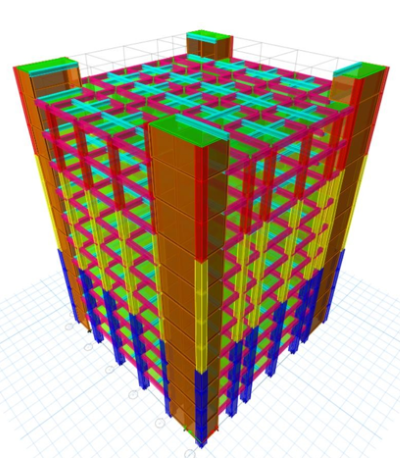Structural Design of a 10-Story Office Building using the Special Moment Frame System (SMFS) in Padang, West Sumatra
DOI:
https://doi.org/10.24036/cived.v11i3.652Keywords:
Earthquake Resistance, Seismic Design Category, Special Moment Resisting Frame (SMRF), Response Spectrum Analysis, ETABSAbstract
Indonesia is located at the convergence of the Eurasian, Pacific, and Indo-Australian tectonic plates, making it prone to significant earthquakes, such as the Aceh earthquake and tsunami in 2004 with a magnitude of 9.1, and the Padang earthquake in 2009 with a magnitude of 7.6, both known for their severe impacts. According to the Central Statistics Agency (BPS), there were 10,843 earthquakes in 2022. Given this high level of risk, all buildings, especially offices, must be designed to be earthquake-resistant due to high activity and user numbers. The city of Padang is categorized in Seismic Design Category D, indicating a high level of earthquake risk. The construction of a ten-story reinforced concrete building for office use is planned, referring to SNI 1726-2019 on earthquake resistance and SNI 1727-2020 on minimum loads, along with the Special Moment Resisting Frame System (SMRF). Structural analysis and modeling are conducted using ETABS software, with element dimensions based on the initial design. This analysis aims to ensure the building meets earthquake resistance requirements through response spectrum evaluation, including natural periods, inter-story drift, P-Delta effects, and checks for irregularities. Based on internal forces from ETABS V.18, reinforcement designs are prepared for structural elements such as columns, beams, slabs, and shear walls. A design capacity evaluation ensures the safety and optimal performance of the structure during an earthquake.
Downloads
References
T. Apryanto and H. Hartopo, "Kajian Hubungan Antara Dimensi Penampang, Mutu Baja Dan Mutu Beton Terhadap Nilai Daktilitas Beton Bertulang," Teknika, vol. 17, no. 2, p. 127, 2022. doi: 10.26623/teknika.v17i2.5423.
Badan Standardisasi Indonesia, SNI 1727:2020 Beban Desain Minimum dan Kriteria Terkait untuk Bangunan Gedung dan Struktur Lain, Jakarta, 2020, pp. 1–336.
Badan Standardisasi Nasional, Persyaratan Beton Struktural untuk Bangunan Gedung. SNI 2847-2019, 2019, pp. 1–720.
E. R. Boyoh, R. S. Windah, and S. O. Dapas, "Perencanaan Hotel Konstruksi Beton Bertulang 12 Lantai di Jln. Ahmad Yani Kota Manado," Jurnal Sipil Statik, vol. 7, no. 8, pp. 913–922, 2019.
T. Joko, Rencana Anggaran Biaya (RAB), Kementerian Pekerjaan Umum dan Perumahan Rakyat, 2018, pp. 1–72.
R. Nursani and D. E. Noor, "Analisis Pengaruh Penambahan Dinding Geser terhadap Perilaku Struktur Gedung Sistem Ganda," Jurnal Teknik Sipil dan Lingkungan, vol. 8, no. 2, pp. 105–114, 2023. doi: 10.29244/jsil.8.02.105-114.
R. Thamrin, R. Kurniawan, B. Yunas, and I. Arifky, "Flexural behavior of reinforced concrete beams with high strength material layer in compression zone," IOP Conference Series: Earth and Environmental Science, vol. 708, no. 1, p. 012083, Apr. 2021. doi: 10.1088/1755-1315/708/1/012083
P. H. Karisoh, S. O. Dupas, and R. P. Dapas, Perencanaan Struktur Gedung Beton Bertulang dengan Sistem Rangka Pemikul Momen Khusus (SRPMK) dan Sistem Rangka Pemikul Momen Menengah (SRPMM), Universitas Sam Ratulangi Manado, 2018, pp. 1–260.
A. D. S. Purwantoro et al., "Studi Perbandingan Pengaruh Letak Dinding Geser pada Bangunan Bertingkat Akibat Beban Gempa," Jurnal Teknik Sipil, vol. 15, pp. 35–45, 2023.
J. O. Simanjuntak and H. P. Harefa, "Analisis Perbandingan Kolom Persegi dan Kolom Bulat dengan Mutu Beton, Luas Penampang, dan Luas Tulangan yang Sama," Jurnal Teknik Sipil, vol. 1, no. 1, pp. 11–24, 2021.
J. O. Simanjuntak, T. E. Saragi, and B. T. L. Gaol, "Beton Bermutu dan Ramah Lingkungan dengan Memanfaatkan Limbah Tongkol Jagung (Penelitian Laboratorium)," Jurnal Visi Eksakta, vol. 1, no. 1, pp. 79–98, 2020. doi: 10.51622/eksakta.v1i1.53.
D. Sistem and P. Standar, Penerapan Standar Nasional Indonesia, 2020.
F. R. Tambingon, D. Martin, S. E. Sumajouw, and Wallah, "Kuat Tekan Beton Geopolymer dengan Perawatan Temperatur Ruangan," Sipil Statik, vol. 6, no. 9, pp. 641–648, 2018.
F. M. Van Gobel, "Nilai Kuat Tekan Beton pada Slump Beton Tertentu," RADIAL – Jurnal Peradaban Sains, Rekayasa dan Teknologi Sekolah Tinggi Teknik (STITEK) Bina Taruna Gorontalo, vol. 5, no. 1, pp. 22–33, 2019.

Downloads
Published
Issue
Section
License
Copyright (c) 2024 Barkhia Yunas, Dyla Midya Octavia, Yuni Purnama Syafri, Wiwin Putri Zayu, Fahma Furqoni, Ramadhi Ramadhi, Ernawati Ernawati

This work is licensed under a Creative Commons Attribution 4.0 International License.

